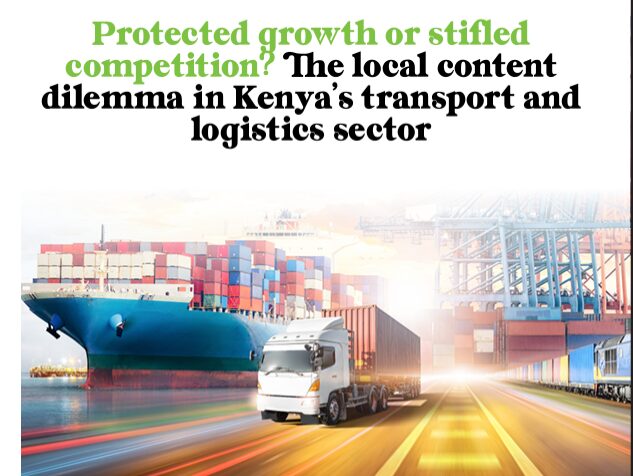Protected growth or stifled competition? The local content dilemma in Kenya’s transport and logistics sector

The Kenya Transport Association (KTA) is up in arms over claims that Multinational Corporations (MNCs) in the transport and logistics sector are abusing their dominant market position. KTA claims that these unfair practices undermine local investors and the broader industry. The KTA has called for the introduction of a quota system, where at least 60% of transport and logistics contracts are awarded to Kenyan enterprises. The rationale is that Kenya has sufficient local capacity to justify such a mandate. They argue that MNCs operating in Kenya should actively engage with and empower local businesses within the sector.
To this end, the National Assembly conducted a public hearing this week to gather views. The hearing’s focus was on whether local transporters are being treated unfairly by the MNCs, creating an imbalanced business environment. It also assessed how well multinational companies comply with local content regulations in areas like warehousing and transportation. Lastly, the hearing aimed to determine if transfer pricing practices by these companies are contributing to an unfair competitive landscape within the logistics and transportation services.
The case for local content policies
Local content policies represent a strategic approach to economic development. The economic case for local content is compelling. When businesses source locally, they create immediate employment opportunities and stimulate economic activity within communities. This employment generation goes beyond direct jobs—it creates indirect employment through supply chains and induced employment through increased local spending power. As local businesses grow to meet demand, they invest in expansion, hire more workers, and create a virtuous cycle of economic growth, instilling hope for the future of the local economy.
Local content requirements also play a crucial role in building domestic industrial capacity. When companies are encouraged or required to source locally, it creates a stable demand that not only allows but ensures local industries to develop and mature, instilling confidence in the future of these industries.
From a financial perspective, local content policies help retain wealth within the country. When goods and services are sourced locally, money circulates within the local economy rather than flowing out to other regions or countries. This increased local circulation of money creates a multiplier effect, where each shilling spent generates additional economic activity within the country. Local businesses are also more likely to reinvest their profits locally, further strengthening the economic base.
Another crucial benefit is the development of entrepreneurship. Local content requirements create protected market opportunities that give local entrepreneurs the confidence to start and grow businesses. By ensuring market access, these policies enable local entrepreneurs to take risks and build businesses.
The drawbacks of local content policies
While local content policies can help domestic businesses grow, they also come with some real risks and problems that we ought to consider carefully.
To begin with, these policies can hurt competition in the market. When we force companies to use local suppliers or give local companies special treatment, we’re limiting who can compete in the market. Quality can also suffer. When local companies are protected from outside competition, they might lack incentive to improve their products and services. International companies often bring new technologies and better ways of doing things. If we keep them out or limit their involvement, local companies might fall behind in terms of quality and innovation. This leads to another problem: local companies might never become truly competitive globally. To succeed in international markets, companies need to be efficient, innovative, and able to meet high standards. But if they are used to being protected at home, they might struggle when they try to sell their products or services abroad where they don’t have these protections.
Local content rules undermine the idea of a free market, where companies compete fairly and customers can choose what they want. These policies basically tell customers and businesses who they must buy from or work with, even if there might be better alternatives available. This goes against the principle that people and businesses should be free to make their own choices about what works best for them.
The cost to the economy can be significant, too. When businesses are forced to use local suppliers that might be more expensive or less efficient, their costs go up. These higher costs often get passed on to consumers through higher prices. We also run the risk of other countries fighting back. If we protect our local companies, other countries might do the same thing to their markets. This could make it harder for local companies to grow beyond the home market.
Conclusion
The crux lies in finding the right balance. While it’s important to support local businesses, this support should push them to become better, not just protect them from competition. Maybe instead of strict quotas or rules, policymakers could focus on helping local companies improve their skills, technology, and efficiency so they can compete fairly with international companies. A better approach might be to have local content policies that gradually reduce protection over time. This gives local companies a chance to grow stronger while knowing they’ll need to compete fairly in the future. It’s like teaching someone to ride a bike – you start with training wheels but eventually take them off so they can ride on their own.

